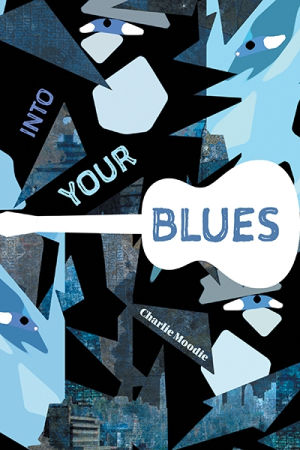Into Your Blues
In the future-set novel Into Your Blues, people from two generations struggle for meaning and fulfillment.
In Charlie Moodie’s fresh and original novel Into Your Blues, middle-aged men’s lives are upended by job losses.
In the post-pandemic future, Ethan drops out of the financial world after being implicated for embezzlement. He becomes an alcoholic hustler, spearheading fundraisers and odd campaigns from home. Ethan is driven by a unique credo that emphasizes personal achievement. Only Blue, a seductive police woman, unsettles him.
Meanwhile, Ethan’s acquaintance has a baby boy who fills him with renewed purpose, and Beckett, a former colleague who was laid off from Ethan’s old company, pursues his dreams of musical success, accepting gigs and busking from Nashville to New York. He, too, is hopeful for the future—in part because of his future daughter.
Set in back rooms and on colorful, busy streets, Ethan and Beckett’s stories are immersive. The book excavates their psyches, including their unconventional ideas about finding meaning in mid-life. But their viewpoints are sometimes misogynistic, including Ethan’s responses to a colleague of his. Still, they’re self-aware about their weaknesses.
Blue is a more ambiguous lead. Positioned as an alluring, near-irresistible force, her development is limited to her carnality. Her back story is sparse, and her interest in music is under developed. She chooses potential conquests based on their apparent abilities to resist her, and it’s a limited device. She reveals herself best through a spliced interview that’s shared between other stories.
The men’s gritty stories, which are ultimately concerned with the lengths that people will go to in order to chase their dreams, converge in a gradual manner. The children who filled the men with meaning become young adults; they set out to work in the entertainment management industry. But their stories are less satisfying than those of their elders, and their late, complicated plan to fulfill their fathers’ legacies is too fraught.
As it progresses, the novel begins to meander through back-and-forth sections that focus on the bustle of a futuristic world full of holograms, surveillance, and ocular interference; its later characters grow less as a result. Media and military campaigns to draw young people into a civil war move the story in a dystopian direction; Blue proves clever about influencing people through technology. Meditations about human autonomy in this changing society, and about the blurring of the everyday with hyperreal replays of memories, come in.
In the future-set novel Into Your Blues, people from two generations struggle for meaning and fulfillment.
Reviewed by
Karen Rigby
Disclosure: This article is not an endorsement, but a review. The publisher of this book provided free copies of the book and paid a small fee to have their book reviewed by a professional reviewer. Foreword Reviews and Clarion Reviews make no guarantee that the publisher will receive a positive review. Foreword Magazine, Inc. is disclosing this in accordance with the Federal Trade Commission’s 16 CFR, Part 255.

